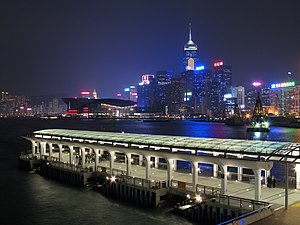pier
Jump to navigation
Jump to search
English
[edit]Etymology
[edit]

From Middle English pere (“bridge pillar”), from Medieval Latin pera, from Old Northern French pire (“breakwater”), from Vulgar Latin *petricus, from Latin petra, from Ancient Greek πέτρα (pétra, “stone”).
Pronunciation
[edit]- (Received Pronunciation) IPA(key): /pɪə(ɹ)/
- (General American) enPR: pîr, IPA(key): /pɪɹ/
Audio (US): (file) - Rhymes: -ɪə(ɹ)
- Homophone: peer
Noun
[edit]pier (plural piers)
- A raised platform built from the shore out over water, supported on piles; used to secure, or provide access to shipping; a jetty.
- Your boat is docked at the pier.
- A similar structure, especially at a seaside resort, used to provide entertainment.
- There is a gaming arcade on the pier.
- 2023 March 22, Paul Clifton, “Network News: Island Line to reopen to Ryde Pier in June... possibly”, in RAIL, number 979, page 24:
- Ryde Pier's claim to fame is being the world's oldest seaside pleasure pier, with construction starting in 1813.
- A structure supporting the junction between two spans of a bridge.
- 1961 January, “Talking of Trains: The Severn Bridge disaster”, in Trains Illustrated, page 5:
- The force of the explosion demolished one pair of piers and two spans of the bridge crashed down into the river on top of the barges.
- (architecture) A rectangular pillar, or similar structure, that supports an arch, wall or roof, or the hinges of a gate.
- Coordinate term: pile
Derived terms
[edit]Translations
[edit]raised platform built from the shore out over water
|
similar structure used to provide entertainment
structure used to accommodate ships
structure supporting the junction between two spans of a bridge
|
rectangular pillar, or similar structure, that supports an arch, wall or roof
|
- The translations below need to be checked and inserted above into the appropriate translation tables. See instructions at Wiktionary:Entry layout § Translations.
Translations to be checked
See also
[edit]Anagrams
[edit]Dutch
[edit]Pronunciation
[edit]Etymology 1
[edit]From Middle Dutch pier, probably from the name Pierre.
Noun
[edit]pier m (plural pieren, diminutive piertje n)
Etymology 2
[edit]Noun
[edit]pier m (plural pieren, diminutive piertje n)
- (architecture) a pier, jetty
Derived terms
[edit]Descendants
[edit]- → Papiamentu: pir
See also
[edit]Etymology 3
[edit]Unknown; Flanders only
Alternative forms
[edit]Noun
[edit]pier m (plural pieren, diminutive piertje n)
Derived terms
[edit]- pieren
- (trap types) steenpier(e), vliegepier(e)
- pierkoorde
Verb
[edit]pier
- inflection of pieren:
References
[edit]- M. J. Koenen & J. Endepols, Verklarend Handwoordenboek der Nederlandse Taal (tevens Vreemde-woordentolk), Groningen, Wolters-Noordhoff, 1969 (26th edition) [Dutch dictionary in Dutch]
Anagrams
[edit]Latin
[edit]Verb
[edit]pier
Middle English
[edit]Noun
[edit]pier
- Alternative form of pere (“peer”)
Adjective
[edit]pier
- Alternative form of pere (“equal”)
Romanian
[edit]Verb
[edit]pier
Romansch
[edit]Alternative forms
[edit]Noun
[edit]pier f (plural piers)
Synonyms
[edit]Slovak
[edit]Pronunciation
[edit]Noun
[edit]pier
Categories:
- English terms inherited from Middle English
- English terms derived from Middle English
- English terms derived from Medieval Latin
- English terms derived from Old Northern French
- English terms derived from Vulgar Latin
- English terms derived from Latin
- English terms derived from Ancient Greek
- English 1-syllable words
- English terms with IPA pronunciation
- English terms with audio pronunciation
- Rhymes:English/ɪə(ɹ)
- Rhymes:English/ɪə(ɹ)/1 syllable
- English terms with homophones
- English lemmas
- English nouns
- English countable nouns
- English terms with usage examples
- English terms with quotations
- en:Architecture
- Rhymes:Dutch/ir
- Rhymes:Dutch/ir/1 syllable
- Dutch terms with audio pronunciation
- Dutch terms inherited from Middle Dutch
- Dutch terms derived from Middle Dutch
- Dutch lemmas
- Dutch nouns
- Dutch nouns with plural in -en
- Dutch masculine nouns
- nl:Zoology
- Dutch terms borrowed from English
- Dutch terms derived from English
- nl:Architecture
- Dutch terms with unknown etymologies
- Dutch terms with archaic senses
- Dutch non-lemma forms
- Dutch verb forms
- Latin non-lemma forms
- Latin verb forms
- Middle English lemmas
- Middle English nouns
- Middle English adjectives
- Romanian non-lemma forms
- Romanian verb forms
- Romansch lemmas
- Romansch nouns
- Romansch feminine nouns
- Sutsilvan Romansch
- rm:Alcoholic beverages
- Slovak terms with IPA pronunciation
- Slovak non-lemma forms
- Slovak noun forms
